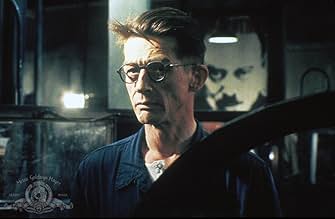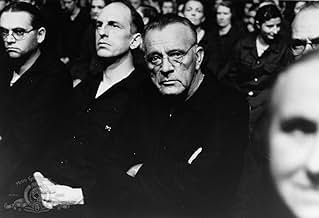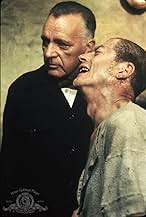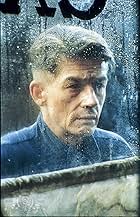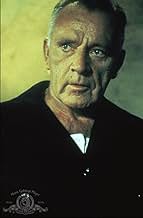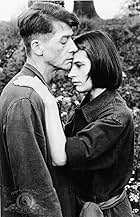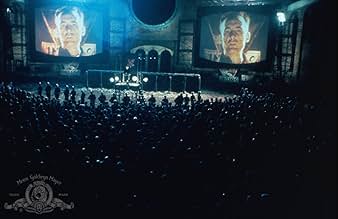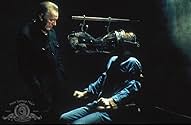In a totalitarian future society, Winston Smith, whose work is re-writing history, tries to rebel. He meets a kindred spirit named Julia and they fall into a love affair.In a totalitarian future society, Winston Smith, whose work is re-writing history, tries to rebel. He meets a kindred spirit named Julia and they fall into a love affair.In a totalitarian future society, Winston Smith, whose work is re-writing history, tries to rebel. He meets a kindred spirit named Julia and they fall into a love affair.
- Director
- Writers
- Stars
- Nominated for 1 BAFTA Award
- 6 wins & 3 nominations total
- Director
- Writers
- All cast & crew
- Production, box office & more at IMDbPro
Featured reviews
Winston Smith (John Hurt) is a drone worker in the Bureau of Information, and his job is to edit the news in accordance with the needs of the governing Party (which is in continual, seemingly endless war with Eurasia and other opposing states). He must also refer to the dictionary of Newsspeak, which is the government's language for the distribution of information.
He lives in a world where there is no escape from the authority of the government who regiment the every thought and deed of their subjects. The Party is steadily working on a way to outlaw the concept of the family and the idea of conception. This is done to eradicate Thoughtcrime and guarantee the worker's total devotion to the Party and its leader, Big Brother.
Winston abides by this (recording his increasingly ambiguous thoughts about society in a hidden, handwritten diary) until he encounters Julia (Suzanna Hamilton), a strange young women with rebellious ideas, to whom he develops a powerful attraction. But their passionate, forbidden relationship cannot escape the all-seeing eyes of Big Brother.....
Screenwriter Jonathan Gems has a done a terrific job with the script. He successfully translates Orwell's ideas to the screen with great clarity. Micheal Radford directs with subtlety around the greasy sets and crumbling locations (the picture was filmed in and around the very area in which Orwell set his novel).
The performances from the chief principals are very strong. John Hurt is excellent as Winston, bringing a subtle and considerate approach to the character. Particularly disturbing is his final scenes, as he becomes gaunt and disfigured through government torture. Suzanna Hamilton is gentle and quirky as Julia and "Rab C Nesbitt" actor Gregor Fisher appears as Winston's ill-fated friend, Parsons.
Veteran actor Richard Burton lends a cold charisma to government enforcer O'Brien and he too excels in the film's final moments, as he coolly and sadistically tortures Winston, subjecting him to severe physical pain to subdue him, casually pulling a tooth out of his rotting mouth, then exposing him to the horrors of Room 101, all the while exhorting obedience to the Party and love to Big Brother.
The strong relevance of the concepts of "Nineteen Eighty Four" should not be underestimated. Whilst the term "Big Brother" is now synonymous with the ridiculous "reality" TV shows of the same name, others like the Two Minutes Hate (in which the workers are coerced, through a two-minute broadcast, into hating the enemies of the state); the idea of a government waging a perpetual war to advocate "peace" (especially relevant in the aftermath of September 11) as well as the editing of news and the abuse of language in order to suit the needs of government and disguise its true agendas are ideas that are chillingly present in today's society.
All of this is powerful and thought-provoking stuff, and helps to make "Nineteen Eighty Four" an accurate and powerful rendering of a still very timely piece of work.
Also, to me at least the missing information made the story feel like it is moving in fast forward. So the pacing felt a bit weird to me.
Personally I enjoyed the film because it put the world and story outside my head. Making me visually look at this twisted world and also experience it from a perspective that's not mine. Which was really interesting.
For these reasons I would recommend all people who read the book watch this movie but definitely not to people who haven't read the book.
The film was obviously a labor of love for director Michael Radford, who also co-wrote the screenplay. As noted in the end credits, the film "was photographed in and around London during the period April-June 1984, the exact time and setting imagined by the author". If this were a big-budget Hollywood bomb, I might consider that a publicity stunt, but in the case of this little-known, little-seen British film, it's fairly obviously a form of homage.
The look of the film is extraordinary in its evocation of the world Orwell created, down to the tiniest detail. Although that world was obviously very different from the real world of 1984, a deliberate choice was made to stick with the Orwellian vision in every way, anachronistic technology and all, and I firmly believe it was the right choice, as opposed to the "updating" we sometimes see in adaptations of classic "futuristic" stories. Thus, we are treated to the baroque and slightly disorienting sight of black rotary-dial telephones, pneumatic document-delivery systems, old-fashioned "safety razors", tube radios, etc., all of which were already obsolete at the time of filming. And of course, the omnipresent black-and-white "telescreens" with rounded picture tubes.
As Winston Smith, the story's protagonist, John Hurt is an inspired piece of casting; absolutely the perfect choice. Not only does he fit the author's description of Smith to a "T", but with the haircut he's given, he even bears a striking resemblance to Orwell himself. And there is no actor alive better than Hurt at evoking victimization in all its infinite gradations and variations. Suzanna Hamilton, relatively little-known here in the US, also does a fine job as Julia. The film also contains the final film appearance of Richard Burton, in one of his most fascinating and disturbing performances as O'Brien. And the great Cyril Cusack does a classic turn as Charrington, the pawnshop proprietor.
Right from the opening scene, in which we look in on a screening of a short propaganda film, brilliantly conceived and executed by Radford, during the daily "two minutes hate", climaxing in Dominic Muldowney's memorable, genuinely stirring national anthem of Oceania played behind the gigantic image of Big Brother, we are catapulted headlong into Orwell's nightmare vision. While not a particularly long novel (my copy is 256 pages), it is nevertheless dense with ideas, and it would be impossible for a standard-length film to include them all, even if the audience could stand all the endless talking heads it would require. Given the inherent limitations, I think the film largely succeeds in preserving a good portion of the ideological "meat" of the novel. It is certainly extremely faithful in the material it does include. Even the incidental music by Eurythmics feels entirely appropriate, and doesn't in any way break the mood. In fact, it even enhances it.
While I thought the 1956 version did a fairly good job for the time, it had a number of flaws in my estimation that made it far less successful an adaptation. For one thing, although the world it portrays is grim, it's not nearly grim enough. Also, Edmond O'Brien may have done a creditable job as Smith, but physically he's all wrong for the part. The portly, even chubby O'Brien bears little resemblance to the slight, emaciated, chronically exhausted, varicose-ulcerated Smith described in the novel. Neither is the 1956 version as faithful to the book; some of the material is softened, and there are odd, unexplainable alterations: O'Brien becomes O'Connor, and I don't think that Goldstein, the possibly imaginary leader of the possibly fictitious "Resistance", is even mentioned. At 90 minutes, it runs a good 23 minutes shorter than the later version, which necessitates the trimming of even more of the novel, for all you literary purists. In all, for me, the 1984 version of "Nineteen Eighty Four" is the definitive version; a remarkably vivid and memorable film.
There are a few successes.
Visually, it manages to capture a run-down nation that has barely progressed for decades, with well chosen locations, and cinematography that succeeds in being washed-out without resorting to darkness (modern filmmakers take note).
Later scenes between Hurt and Burton are taut and powerful. Even though you get the feeling that Burton had done very little to learn his lines, his presence and delivery more than compensate - he is well cast as O'Brien.
But Hurt is not a great Winston Smith. Smith is a dreamer, but Hurt doesn't capture that. His relationship with Suzanna Hamilton's Julia doesn't convince as a result.
The pacing of the first two acts is slow. And I do wonder whether someone who hasn't already read the book would find it had to engage with the film at all. It's just a bit flat.
Did you know
- TriviaIn poor health during most of the filming, Richard Burton had great difficulty remembering his lines and sometimes had to film a scene dozens of times before he could get it right. The scene in O'Brien's apartment where he is talking to Winston about Goldstein's book took a record of forty-one takes for Burton to say his speech without fumbling his lines.
- GoofsWinston reads a newspaper article titled "INSOC IN RELATION TO CHESS BROTHER WINS." The party name should be spelled "INGSOC."
- Quotes
Winston Smith: [reads from Goldstein's book] "In accordance to the principles of Doublethink, it does not matter if the war is not real, or when it is, that victory is not possible. The war is not meant to be won. It is meant to be continuous. The essential act of modern warfare is the destruction of the produce of human labor. A hierarchical society is only possible on the basis of poverty and ignorance. In principle, the war effort is always planned to keep society on the brink of starvation. The war is waged by the ruling group against its own subjects. And its object is not victory over Eurasia or Eastasia, but to keep the very structure of society intact." Julia? Are you awake? There is truth, and there is untruth. To be in a minority of one doesn't make you mad.
- Crazy creditsThe movie begins with the title, "Who controls the past controls the future. Who controls the present controls the past."
- Alternate versionsFrom director of photography Roger Deakins: "Be careful which '1984' you watch as some do not have the 'Bleach Bypass' effect built in. As the effect was done on all the prints, the IP and subsequent INs do not reflect the intended look of the film."
- ConnectionsFeatured in Eurythmics: Sexcrime (Nineteen Eighty-Four) (1984)
- SoundtracksOceania,'Tis For Thee
Music by Dominic Muldowney
Lyrics by Jonathan Gems
Sung by the London Voices, directed by Terry Edwards
Soprano soloist: Sally Mates
Contralto soloist: Linda Hirst
Conducted by Dominic Muldowney
Details
- Release date
- Countries of origin
- Language
- Also known as
- Neunzehnhundertvierundachtzig
- Filming locations
- Production companies
- See more company credits at IMDbPro
Box office
- Budget
- £3,000,000 (estimated)
- Gross US & Canada
- $8,430,492
- Opening weekend US & Canada
- $29,897
- Dec 16, 1984
- Gross worldwide
- $8,431,544
Contribute to this page



